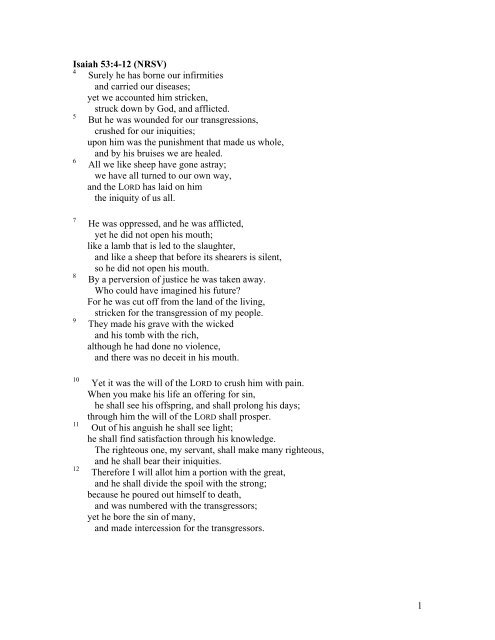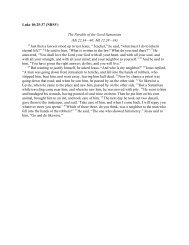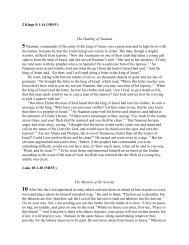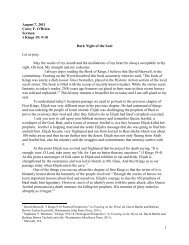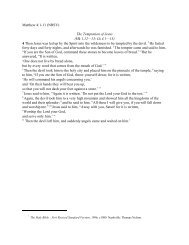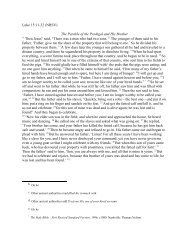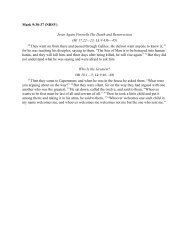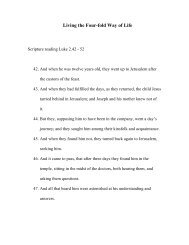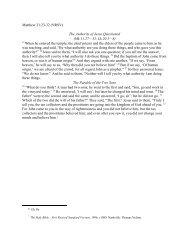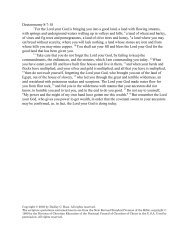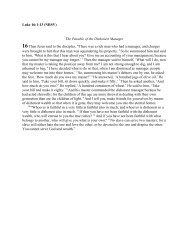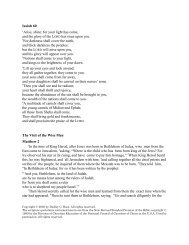Surely he has borne our infirmities and carried our diseases
Surely he has borne our infirmities and carried our diseases
Surely he has borne our infirmities and carried our diseases
You also want an ePaper? Increase the reach of your titles
YUMPU automatically turns print PDFs into web optimized ePapers that Google loves.
Isaiah 53:4-12 (NRSV)<br />
4<br />
<strong>Surely</strong> <strong>he</strong> <strong>has</strong> <strong>borne</strong> <strong>our</strong> <strong>infirmities</strong><br />
<strong>and</strong> <strong>carried</strong> <strong>our</strong> <strong>diseases</strong>;<br />
yet we accounted him stricken,<br />
struck down by God, <strong>and</strong> afflicted.<br />
5<br />
But <strong>he</strong> was wounded for <strong>our</strong> transgressions,<br />
crus<strong>he</strong>d for <strong>our</strong> iniquities;<br />
upon him was t<strong>he</strong> punishment that made us whole,<br />
<strong>and</strong> by his bruises we are <strong>he</strong>aled.<br />
6<br />
All we like s<strong>he</strong>ep have gone astray;<br />
we have all turned to <strong>our</strong> own way,<br />
<strong>and</strong> t<strong>he</strong> LORD <strong>has</strong> laid on him<br />
t<strong>he</strong> iniquity of us all.<br />
7<br />
8<br />
9<br />
He was oppressed, <strong>and</strong> <strong>he</strong> was afflicted,<br />
yet <strong>he</strong> did not open his mouth;<br />
like a lamb that is led to t<strong>he</strong> slaughter,<br />
<strong>and</strong> like a s<strong>he</strong>ep that before its s<strong>he</strong>arers is silent,<br />
so <strong>he</strong> did not open his mouth.<br />
By a perversion of justice <strong>he</strong> was taken away.<br />
Who could have imagined his future<br />
For <strong>he</strong> was cut off from t<strong>he</strong> l<strong>and</strong> of t<strong>he</strong> living,<br />
stricken for t<strong>he</strong> transgression of my people.<br />
T<strong>he</strong>y made his grave with t<strong>he</strong> wicked<br />
<strong>and</strong> his tomb with t<strong>he</strong> rich,<br />
although <strong>he</strong> had done no violence,<br />
<strong>and</strong> t<strong>he</strong>re was no deceit in his mouth.<br />
10<br />
11<br />
12<br />
Yet it was t<strong>he</strong> will of t<strong>he</strong> LORD to crush him with pain.<br />
W<strong>he</strong>n you make his life an offering for sin,<br />
<strong>he</strong> shall see his offspring, <strong>and</strong> shall prolong his days;<br />
through him t<strong>he</strong> will of t<strong>he</strong> LORD shall prosper.<br />
Out of his anguish <strong>he</strong> shall see light;<br />
<strong>he</strong> shall find satisfaction through his knowledge.<br />
T<strong>he</strong> righteous one, my servant, shall make many righteous,<br />
<strong>and</strong> <strong>he</strong> shall bear t<strong>he</strong>ir iniquities.<br />
T<strong>he</strong>refore I will allot him a portion with t<strong>he</strong> great,<br />
<strong>and</strong> <strong>he</strong> shall divide t<strong>he</strong> spoil with t<strong>he</strong> strong;<br />
because <strong>he</strong> p<strong>our</strong>ed out himself to death,<br />
<strong>and</strong> was numbered with t<strong>he</strong> transgressors;<br />
yet <strong>he</strong> bore t<strong>he</strong> sin of many,<br />
<strong>and</strong> made intercession for t<strong>he</strong> transgressors.<br />
1
T<strong>he</strong> Suffering Servant<br />
A sermon preac<strong>he</strong>d at North Prospect Union UCC, Medford, MA<br />
Date: October 18, 2009 Rev. Dudley C. Rose<br />
Scripture: Isaiah 53:4–12<br />
T<strong>he</strong>y say that a little knowledge is a dangerous thing. T<strong>he</strong>y say that a little knowledge is<br />
a dangerous thing, <strong>and</strong> t<strong>he</strong>y are right. Let me tell you a story.<br />
Almost 30 years ago this fall, 29 to be exact, I entered divinity school to prepare for t<strong>he</strong><br />
ministry. In my first term I took t<strong>he</strong> Introduction to t<strong>he</strong> Old Testament c<strong>our</strong>se. T<strong>he</strong> pace was<br />
breathtaking—three months from Genesis to Malachai, from Adam <strong>and</strong> Eve to t<strong>he</strong> rise <strong>and</strong> fall of<br />
David’s empire <strong>and</strong> more. W<strong>he</strong>n classes ended near Christmas time, visions of patriarchs,<br />
matriarchs <strong>and</strong> prop<strong>he</strong>ts were dancing in my <strong>he</strong>ad, a gr<strong>and</strong> array of sugarplums of information.<br />
So, I was not in t<strong>he</strong> least disappointed w<strong>he</strong>n my home church minister asked if I wanted<br />
to preach t<strong>he</strong> Sunday after Christmas. For <strong>he</strong>r it was an opportunity to get out of town. For me it<br />
was a chance show off my newly acquired Biblical knowledge. With a pace that made t<strong>he</strong><br />
divinity school c<strong>our</strong>se seem leisurely, in 20 minutes we covered t<strong>he</strong> whole swath of ancient<br />
Israel’s history. We flew though Abraham <strong>and</strong> Sarah; Joseph, Moses <strong>and</strong> Pharaoh. Joshua,<br />
Judges <strong>and</strong> t<strong>he</strong> monarchs each got a few seconds, until we screec<strong>he</strong>d across t<strong>he</strong> finish line with<br />
Nebuchadnezzar, Cyrus <strong>and</strong> Ne<strong>he</strong>miah.<br />
Though we had raced through a lot of material, I made sure to lay out t<strong>he</strong> gr<strong>and</strong> logic of<br />
t<strong>he</strong> story as we went along. Israel came into t<strong>he</strong> Promised L<strong>and</strong>. T<strong>he</strong>y did well for awhile, but<br />
t<strong>he</strong>n t<strong>he</strong> kings <strong>and</strong> t<strong>he</strong> people started to get corrupt. Israel once again fell for idols. S<strong>he</strong> failed to<br />
protect t<strong>he</strong> orphan <strong>and</strong> t<strong>he</strong> widow. S<strong>he</strong> was just bad, bad, bad. And so God, who had given t<strong>he</strong>m<br />
plenty of warning, finally lowered t<strong>he</strong> boom. First came t<strong>he</strong> armies of Assyria, which lopped off<br />
t<strong>he</strong> nort<strong>he</strong>rn kingdom. Still t<strong>he</strong> people did not change. A century <strong>and</strong> a quarter later Babylon<br />
finis<strong>he</strong>d t<strong>he</strong> job. T<strong>he</strong>y destroyed t<strong>he</strong> sacred temple <strong>and</strong> <strong>carried</strong> t<strong>he</strong> people of Judah off into<br />
Exile. Ancient Israel’s enemies were God’s instruments to punish t<strong>he</strong> rebellious chosen people.<br />
I said, Amen. We sang t<strong>he</strong> final hymn. T<strong>he</strong>n came t<strong>he</strong> greeting in t<strong>he</strong> nart<strong>he</strong>x. Old<br />
friends <strong>and</strong> family were impressed with my newly acquired knowledge, <strong>and</strong> t<strong>he</strong>y said many kind<br />
things. As I was basking in t<strong>he</strong> warmth of it all, a man came through t<strong>he</strong> line <strong>and</strong> approac<strong>he</strong>d<br />
me. “That was very interesting,” <strong>he</strong> said. “It <strong>he</strong>lps me make sense of t<strong>he</strong> holocaust. I see what<br />
God must have been up to.”<br />
My jaw nearly dropped. Let me be clear. It didn’t drop because I thought this man was<br />
an idiot or a bigot. I don’t even know if <strong>he</strong> said what <strong>he</strong> said to force me to realize t<strong>he</strong> logical<br />
extension of my own words. In eit<strong>he</strong>r case, my jaw dropped because, based on what I had just<br />
preac<strong>he</strong>d, his stated conclusion was completely warranted. If Assyria <strong>and</strong> Babylon were God’s<br />
instruments to destroy t<strong>he</strong> Jews in Biblical times, why could not Germany be God’s instrument<br />
in t<strong>he</strong> 20 th century T<strong>he</strong> logic was unassailable, t<strong>he</strong> conclusion unpalatable. Never had I so<br />
poignantly experienced t<strong>he</strong> danger of my own little knowledge. And never have I been more<br />
aware of t<strong>he</strong> responsibility entrusted to t<strong>he</strong> preac<strong>he</strong>r. I left t<strong>he</strong> church scorc<strong>he</strong>d by t<strong>he</strong> peril of<br />
my first sermon at home. You recall that Jesus in Luke nearly gets run off t<strong>he</strong> cliff because <strong>he</strong><br />
preac<strong>he</strong>d t<strong>he</strong> truth in his first sermon at home. I was congratulated for preaching a lie, <strong>and</strong> I<br />
wondered if maybe I should jump off a cliff.<br />
1
Well, many years <strong>and</strong> much study have passed since that tormenting moment, but it<br />
continues to echo in my mind. I hope, <strong>and</strong> I think, that it echoes t<strong>he</strong>re not just because I am still<br />
wounded by my early failure, though I admit that’s a possibility. But I think it echoes t<strong>he</strong>re still<br />
because t<strong>he</strong> message of that sermon, as horrifying as it was, was indeed possible to find in t<strong>he</strong><br />
Biblical text. T<strong>he</strong> story I told is t<strong>he</strong> story Israel told <strong>he</strong>rself to explain <strong>he</strong>r crushing defeats <strong>and</strong><br />
deportations. And it is a story that seems natural for us human beings.<br />
Frederick Buechner says in his little book Wishful Thinking that even <strong>our</strong> t<strong>he</strong>ology of<br />
<strong>he</strong>aven <strong>and</strong> <strong>he</strong>ll betray <strong>our</strong> hope that somew<strong>he</strong>re someone is keeping score, that t<strong>he</strong> good <strong>and</strong> bad<br />
things that happen happen because t<strong>he</strong>y make sense, because both t<strong>he</strong> good <strong>and</strong> t<strong>he</strong> bad things<br />
are just <strong>and</strong> deserved.<br />
T<strong>he</strong> story of Job is a good example of t<strong>he</strong> depth of t<strong>he</strong> story’s roots in human thinking.<br />
Job loses everything, ironically because of a bet between God <strong>and</strong> Satan. Job is flabbergasted.<br />
He <strong>has</strong> been completely upright. Even God says so. But because <strong>he</strong> is suffering his friends<br />
Eliphaz, Bildad, <strong>and</strong> Zophar are sure Job <strong>has</strong> done something to deserve it. T<strong>he</strong> more Job<br />
protests, t<strong>he</strong> more certain t<strong>he</strong>y are. Over chapter upon chapter Job’s friends try to get him to<br />
admit his wrongdoing <strong>and</strong> repent. Like Job’s friends I suppose that most of us would like t<strong>he</strong><br />
cosmic arithmetic to add up. Much of <strong>our</strong> talk about God persists to insist that it does add up.<br />
We want to believe that if you work hard, stay out of trouble <strong>and</strong> do unto ot<strong>he</strong>rs as you would<br />
have t<strong>he</strong>m do unto you, everything will workout just fine. But we also cannot <strong>he</strong>lp but see t<strong>he</strong><br />
danger in it. We know that Job did those things. We know that Eliphaz, Bildad, <strong>and</strong> Zophar<br />
were wrong. And surely we know that t<strong>he</strong> Nazi Third Reich was, too. A reliable mat<strong>he</strong>matics of<br />
t<strong>he</strong> causes of deserved suffering eludes us.<br />
But, of c<strong>our</strong>se, once we lose t<strong>he</strong> reliability of t<strong>he</strong> math, we are plunged into one of t<strong>he</strong><br />
most intractable of all t<strong>he</strong>ological conundrums. Why do bad things happen to good people If<br />
t<strong>he</strong> Jews didn’t deserve t<strong>he</strong> holocaust, which t<strong>he</strong>y most surely didn’t, why did it happen Or as it<br />
is sometimes stated, why did God let it happen<br />
Let me be honest with you. At least phrased in t<strong>he</strong> latter way, why does God allow<br />
suffering, I don’t think t<strong>he</strong>re is a satisfactory answer. This was t<strong>he</strong> question that Job posed, <strong>and</strong><br />
God answered, basically, “Hey Job, you weren’t <strong>he</strong>re w<strong>he</strong>n I made creation. What do you<br />
know” It’s not an answer, really, but it’s probably t<strong>he</strong> best we can do. As frustrating as it is to<br />
say it, we just don’t know.<br />
But we human beings don’t give up on t<strong>he</strong> math that easily. And that leads us, to t<strong>he</strong><br />
<strong>he</strong>art of this morning’s passage from Isaiah, a passage about t<strong>he</strong> suffering servant. It would be<br />
hard to miss t<strong>he</strong> similarity between Isaiah’s suffering servant <strong>and</strong> Jesus. “He was wounded for<br />
<strong>our</strong> transgressions, crus<strong>he</strong>d for <strong>our</strong> iniquities,” Isaiah says. T<strong>he</strong> suffering servant didn’t deserve<br />
to suffer. On t<strong>he</strong> ot<strong>he</strong>r we are guilty of transgressions <strong>and</strong> iniquity. So, t<strong>he</strong> logic goes, God<br />
caused t<strong>he</strong> suffering servant to suffer in <strong>our</strong> stead, to take on <strong>our</strong> sins. So, t<strong>he</strong> logic furt<strong>he</strong>r goes,<br />
w<strong>he</strong>n t<strong>he</strong>re is transgression <strong>and</strong> iniquity, God dem<strong>and</strong>s that somebody pay up. Thank God, t<strong>he</strong><br />
logic goes, God accepts a substitute for us, <strong>and</strong> we get off Scott-free. Grace, we call it. We get<br />
better than we deserve. T<strong>he</strong> suffering servant gets worse than <strong>he</strong> deserves. It all comes out in<br />
t<strong>he</strong> wash. As you know, such a t<strong>he</strong>orem undergirds perhaps t<strong>he</strong> most popular version of<br />
Christian salvation. Jesus suffers on <strong>our</strong> behalf, <strong>and</strong> we are saved from <strong>our</strong> sins.<br />
I’m not sure this is much of an advance. If we go back to t<strong>he</strong> aftermath of my first<br />
sermon at home, I might have said, “Well, no, t<strong>he</strong> Jews in Germany <strong>and</strong> Pol<strong>and</strong> didn’t deserve<br />
t<strong>he</strong> gas chambers, but somebody did (maybe it was even t<strong>he</strong> Germans who deserved it), but God<br />
2
let t<strong>he</strong> Jews pay t<strong>he</strong> price in t<strong>he</strong>ir place.” I don’t know about you, but I just don’t find that a very<br />
satisfactory solution, eit<strong>he</strong>r.<br />
Every time we try to give an explanation to why God causes suffering we are going to<br />
end up in just such a perverted place. And maybe that ought to convince us that we are asking<br />
t<strong>he</strong> wrong question, t<strong>he</strong> wrong question of God, <strong>and</strong> t<strong>he</strong> wrong question of t<strong>he</strong> Bible. For, if we<br />
look carefully, t<strong>he</strong> Bible, as God’s revelation, often cuts against t<strong>he</strong> grain of <strong>our</strong> knee-jerk<br />
reading of it. Often we don’t see it because we read into t<strong>he</strong> Bible what we expect to find.<br />
We too readily assume that accounts of t<strong>he</strong> suffering servant, or Jesus’ death are just<br />
special cases of deserved suffering. Sometimes we assume it so much that those are t<strong>he</strong> answers<br />
we read t<strong>he</strong> text to find, <strong>and</strong> we fail to see that this amazing piece of poetry is answering a<br />
different question altoget<strong>he</strong>r. God simply doesn’t answer why <strong>he</strong> causes or allows suffering.<br />
That may be pretty frustrating, but God just doesn’t answer those questions.<br />
But God does answer t<strong>he</strong> question of what <strong>he</strong> tries to make out of t<strong>he</strong> suffering,<br />
especially w<strong>he</strong>n it is we human beings who cause it. People caused t<strong>he</strong> holocaust. People<br />
crucified Jesus. And people struck <strong>and</strong> afflicted <strong>and</strong> bruised t<strong>he</strong> suffering servant in this<br />
morning’s passage. T<strong>he</strong>re was transgression to spare. That part we get right. But t<strong>he</strong><br />
transgressions are to be found in t<strong>he</strong>se very actions against t<strong>he</strong> innocents—t<strong>he</strong> Jews, t<strong>he</strong><br />
suffering servant, <strong>and</strong> Jesus himself. Human sinfulness, human fallenness is t<strong>he</strong> human<br />
condition, but it manifests itself very often in actions that cause suffering to those who are t<strong>he</strong><br />
most innocent.<br />
T<strong>he</strong>re are many reasons we do it. Sometimes it’s lust for power. Sometimes it’s fear.<br />
Sometimes it’s insecurity. Sometimes it’s to distract us from <strong>our</strong> real problems. Sometimes it’s<br />
to blame ot<strong>he</strong>rs for <strong>our</strong> problems. Interestingly, though, w<strong>he</strong>n we perpetrate suffering mostly <strong>our</strong><br />
truest reasons are hidden from <strong>our</strong> sight. Germany blamed t<strong>he</strong> Jews, among ot<strong>he</strong>rs, for <strong>he</strong>r post<br />
World War I problems. Both Pilate <strong>and</strong> Caiap<strong>has</strong> saw Jesus as a threat to peace <strong>and</strong> stability.<br />
Neit<strong>he</strong>r Germany nor Jerusalem said, “Let’s kill some innocents.” That’s what t<strong>he</strong>y did. We can<br />
argue that t<strong>he</strong>y should have seen it for what it was. But t<strong>he</strong> fact is that t<strong>he</strong>y deluded t<strong>he</strong>mselves<br />
into seeing a perversion as perfectly reasonable. And we should be cautious in saying how much<br />
t<strong>he</strong>y missed t<strong>he</strong> obvious, for we may well be missing such obvious things <strong>he</strong>re <strong>and</strong> now. T<strong>he</strong><br />
moral of this story may be how hidden from us are t<strong>he</strong> obvious things we miss.<br />
And that’s w<strong>he</strong>re God comes into t<strong>he</strong> story. God’s <strong>he</strong>art is in a state of perpetual<br />
brokenness for t<strong>he</strong> anguish that we cause. God weeps day <strong>and</strong> night for t<strong>he</strong> pain we suffer <strong>and</strong><br />
t<strong>he</strong> pain we cause. And w<strong>he</strong>n God can, <strong>he</strong> takes that pain <strong>and</strong> suffering <strong>and</strong> tries to expose it to<br />
us for what it is, tries to un-cloud <strong>our</strong> vision, tries to undermine <strong>our</strong> obscuring logic.<br />
Isaiah’s suffering servant is one of t<strong>he</strong> clearest examples of God’s attempt to illuminate<br />
<strong>our</strong> situation. T<strong>he</strong> fact that we most easily read t<strong>he</strong> story as how God made t<strong>he</strong> servant suffer in<br />
<strong>our</strong> place shows just how persistent is t<strong>he</strong> veil on <strong>our</strong> eyes. T<strong>he</strong> suffering servant is not a story<br />
about God punishing an innocent ot<strong>he</strong>r in <strong>our</strong> stead. It is a story about how God shows us t<strong>he</strong><br />
death <strong>and</strong> destruction we cause, <strong>and</strong> t<strong>he</strong>n it is a story about how God redeems it, turns it into life.<br />
As a sidebar <strong>he</strong>re let me be clear. Redemptive suffering <strong>has</strong> gotten a very bad reputation,<br />
<strong>and</strong> it is absolutely well-deserved. T<strong>he</strong> suffering we are talking about is not caused by God. It is<br />
caused by people. And t<strong>he</strong> redemption isn’t in saying that t<strong>he</strong> suffering is something good to<br />
have happened. T<strong>he</strong> suffering we cause is bad, period. What good thing God does, t<strong>he</strong><br />
redemption God works, if you will, is to shine a light on how we cause t<strong>he</strong> suffering, to unveil of<br />
deluded sight, <strong>and</strong> also to say that t<strong>he</strong> suffering is not t<strong>he</strong> end of t<strong>he</strong> story. Out of death, God<br />
will create life.<br />
3
In t<strong>he</strong> Christian version of this story God redeems us sinners through a very interesting<br />
means. We remember t<strong>he</strong> unwarranted death of Jesus every time we celebrate communion. As<br />
t<strong>he</strong> t<strong>he</strong>ologian Mark Heim notes, in taking communion t<strong>he</strong> earliest Christians remembered that at<br />
Jesus’ death those closest to him played t<strong>he</strong> roles of betrayer, deserter <strong>and</strong> denier. Communion,<br />
t<strong>he</strong>n, serves a double purpose. It illumines <strong>our</strong> capacity for murdering t<strong>he</strong> innocent, <strong>and</strong> at t<strong>he</strong><br />
same time it replaces that very act in <strong>our</strong> history with a shared meal, an alternative way of being<br />
toget<strong>he</strong>r.<br />
“W<strong>he</strong>n Christians gat<strong>he</strong>r at communion, t<strong>he</strong>y encounter t<strong>he</strong> unequivocal reminder of<br />
Christ’s bloody death. T<strong>he</strong>y are faced with t<strong>he</strong> fact that victims have real flesh <strong>and</strong> blood. [But]<br />
w<strong>he</strong>n we <strong>he</strong>ar, ‘Do this in remembrance of me,’ we should <strong>he</strong>ar” 1 do this, this meal toget<strong>he</strong>r,<br />
instead of that bloody thing. Do this in remembrance of me. W<strong>he</strong>n we do this, we are freed tell<br />
better <strong>and</strong> truer stories of God than t<strong>he</strong> one I told my home church 29 years ago. Thanks be to<br />
God. Amen.<br />
1 Heim, 235<br />
4


